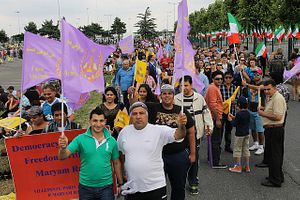Earlier this summer, on June 27, a gathering of over 100,000 opponents of the Iranian regime took place outside of Paris. Hundreds of political dignitaries from across the world took the stage before supporters of the National Council of Resistance of Iran (NCRI) to show their support for the Iranian Resistance and a free and democratic Iran. They also shared their perspectives on the repressive record of the mullahs’ government, and the dangerous prospects for its continued involvement in other countries’ affairs. The crisis in Iraq and the rise of the Islamic State were just beginning to escalate at the time, and the Iranian regime’s role in those events was on the lips of most of the speakers in Paris.
Those who closely follow Iran’s activities in the Middle East understand that its government and its Revolutionary Guards are the major driving force in the civil war that is still tearing Iraq apart. Moreover, Iran is central to the broader conflict that has seemingly put the entire Middle East beyond hope of stability. That conflict has given rise to a multi-national “caliphate,” the Islamic State (ISIS), and it is no coincidence that it has emerged in the two nations where Iran wields the strongest influence.
Iran, a Shiite theocracy, and the ISIS, a Sunni theocracy wannabe, are fierce ideological opponents, of course. But they have some essential features in common, not the least of which is a disdain for human life, especially when subordinated to their perverse religious views or strategic interests. This is on display in the mass executions by the ISIS on the battlefield and by the Iranian regime in its prisons or public hangings on Iran’s streets, where activism and peaceful organizing can make a person subject to the death penalty on arbitrary charges as “Waging War against God.”
When this is the nature of both sides of the conflict, it is foolish to conclude that one is somehow better than the other. And perhaps more importantly, siding with one over the other is a self-defeating strategy, because each side feeds the other. Even assuming that the complete defeat of the ISIS is possible, if it leads to Iran retaining its hold in Iraq and Syria, the clash of ideologies will only emerge in a new form at a later date.
No doubt Iran is well aware of the fact that a strong Sunni insurgency adds urgency to the cause of solidarity among fundamentalist Shiites, so long as that insurgency doesn’t threaten the Shiite leadership in Tehran. And some Iranian officials have explicitly declared that the ISIS is no threat to them.
That has not stopped them from pouring resources into Iraq to mobilize and support Shiite militias through shipments of arms, and an ever-increasing role for the Revolutionary Guards’ Qods Force on the battlefield.
Indeed, foreign analysts have observed that Qods Force commander Qassem Soleimani is the most powerful single figure in Iraq today, and the chief source of violence coming from the Iranian side.
The presence of ISIS in Iraq gives Iran a ready excuse for its interventionism, and the continuation of the war expands Iran’s malign regional influence. Meanwhile, it is that Iranian influence in Iraq that makes ISIS so capable of winning Sunni fighters to their side. Support for one side over the other only continues the cycle, playing into the extremists’ hands.
It was, after all, Iran that created this crisis in the first place. Maliki’s backing from Tehran emboldened him to shut out Sunnis and other minorities from government, to attack those who resisted, and to confirm Baghdad’s status as a proxy of the Shiite leadership in Tehran by attempting to destroy Iranian opposition groups at Camps Ashraf and Liberty.
Awareness of these facts led to resounding agreement with Mrs. Maryam Rajavi’s assessment of the situation when she spoke at the Paris gathering. The president-elect of the NCRI concluded that stability and democracy in Iraq will only be possible following the removal of Nouri al-Maliki and the complete eviction of the Iranian regime from the country.
With the designation of Haider al-Abadi as Iraq’s new prime minister-designate, the first of those prerequisites has been fulfilled. But the second and more important condition seems sadly unlikely. Western politicians as prominent as the Prime Minister David Cameron have suggested that Iran might be a viable partner in the world’s fight against the ISIS expansion into Iraq.
The policy of the West should be to defeat Islamic extremism in the region, and to bring about a sustainable reduction in violence. That will never be possible so long as the Iranian regime and its well-recognized disdain for human life continue to hold sway beyond its own borders. The first logical step in that direction would be to actively support the democratic aspirations of the Iranian people and to back and engage with Mrs. Rajavi’s movement, the Iranian Resistance.
Baroness Turner of Camden was Deputy Speaker of the British House of Lords until 2008 and she is currently a leading member of the British Parliamentary Committee for Iran Freedom (BPCIF)

































